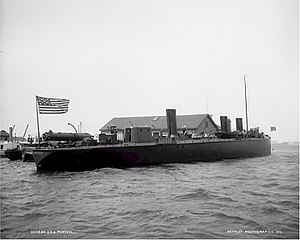Porter-class torpedo boat

USS Porter (TB-6), October 3, 1897.
|
|
| History | |
|---|---|
|
|
|
| Name: | Porter |
| Namesake: | |
| Ordered: | 2 March 1895 |
| Builder: | Herreshoff Manufacturing Co., Bristol, Rhode Island |
| Laid down: | February 1896 |
| Launched: | 9 September 1896 |
| Sponsored by: | Miss Agnes M. Herreshoff |
| Commissioned: | 20 February 1897 |
| Decommissioned: | 1912 |
| Struck: | 6 November 1912 |
| Identification: | TB-6 |
| Fate: | sold, 30 December 1912 |
| General characteristics | |
| Class and type: | Porter-class torpedo boat |
| Displacement: | 165 long tons (168 t) |
| Length: | 175 ft 6 in (53.49 m) |
| Beam: | 17 ft 9 in (5.41 m) |
| Draft: | 4 ft 8 in (1.42 m) (mean) |
| Installed power: |
|
| Propulsion: |
|
| Speed: | |
| Complement: | 32 officers and enlisted |
| Armament: |
|
USS Porter (Torpedo Boat No. 6/TB-6) was a torpedo boat, the first of her class, launched in 1896, served during the Spanish–American War, and struck in 1912. She was the first Navy ship named for Commodore David Porter, and his son, Admiral David Dixon Porter.
Porter was laid down in February 1896 by Herreshoff Manufacturing Co., Bristol, Rhode Island: launched on 9 September 1896, sponsored by Miss Agnes M. Herreshoff; and commissioned on 20 February 1897 at Newport, R.I., Lieutenant John Charles Fremont in command.
Porter sailed to Washington, D.C. on 27 February 1897 for inspection and was further examined on 16–20 March at New York by the Chief of the Bureau of Navigation. She operated between New London and Newport; then visited New York from 15 July-3 October before getting underway for her winter port, Charleston, South Carolina. Porter cruised in southern waters until 8 December and then proceeded to Key West where she was stationed from 1–22 January 1898.
Porter arrived on 26 January at Mobile on 26 January for a visit, but she was ordered to return to Key West on 6 March because of the tense situation in Cuba. When the United States declared war upon Spain, she was already patrolling the waters off Key West and the Dry Tortugas. Porter returned to Key West on 22 March for replenishment on 22 March.
Porter departed Key West with the North Atlantic Fleet on 22 April for the blockade of the north coast of Cuba. She soon made contact with the enemy, capturing the Spanish schooners Sofia and Matilda on 23–24 April. After refueling at Key West from 2–7 May, Porter resumed blockade duty off Cap-Haïtien, Haiti keeping a watchful eye out for Cervera's squadron. She participated in the three-hour bombardment of San Juan on 12–13 May, along with the nine ships of Rear Admiral W. T. Sampson's fleet. During the attack, Porter maintained a close position under the batteries with the cruiser Detroit, but she was not hit.
...
Wikipedia
